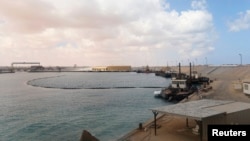Libya has restarted oil exports from its biggest port, Es Sider, for the first time since the end of a year-long blockade, which is a boost to the central government struggling with a wave of clashes in the capital.
The OPEC member's oil production has risen in the past few weeks to about 560,000 barrels a day as ports in the east have resumed work under a deal with a group of federalist rebels, adding to a crude market that is already well supplied.
But in a reminder of the risk of further instability, the acting oil minister said he had resigned, while heavy fighting erupted in a suburb of the main eastern city Benghazi between forces of a renegade general and Islamist fighters. Explosions were so loud they could be heard in the city center.
Home to the headquarters of several oil firms, Benghazi is located some 130 kilometer from Zueitina, one of the four reopened eastern ports.
A tanker has docked at Es Sider and begun loading 600,000 barrels of oil, said Mohamed El Harari, spokesman for state-run National Oil Corp (NOC). Ship tracking data on Reuters showed the Aframax tanker Maria Bottiglieri anchored at Es Sider.
Technical problems and mistrust between the rebels and the government had delayed implementing an oil port deal but output has risen to 562,000 barrels per day (bpd), NOC said on Tuesday. This is well above lows of barely 100,000 bpd seen earlier this year, but still well short of levels of about 1.4 million bpd a year ago.
Traders and shipping sources expect several more cargoes to be shipped by companies with stakes in the Waha Oil Co, which runs the Es Sider port and connected oilfields, such as Marathon Oil, Hess, and ConocoPhillips. Austria's OMV AG is also expected to lift a cargo.
The North African country badly needs higher exports to cover budget needs as oil is the only source of income.
The Es Sider port currently holds some 4.5 million barrels in storage, but once the tanks are emptied, the connected oilfields can restart production, officials said.
“The returning oil supply from Libya is flooding a market that is already amply supplied,” said Commerzbank analyst Carsten Fritsch
New oil minister
Clashes in Tripoli and Benghazi have mostly occurred away from oilfields and ports, which in the past have often been the target of takeovers by armed factions pressing political or economic demands on the country's fragile government.
Apart from fighting another constant feature in post-Gadhafi Libya is frequent changes of senior government positions, reflecting political infighting and fast-changing alliances.
Acting Oil Minister Omar Shakmak said on Wednesday that he would resign following a written request by Prime Minister Abdullah al-Thinni.
“I will abide by the decision because it is not a matter of job, but it is Libya. We can serve Libya in different jobs,” he told Reuters by phone. He did not say why he would be replaced.
NOC Chairman Mustafa Sanallah will take over Shakmak's job as deputy minister while remaining at the helm of the oil firm, Harari said. Since there has been no oil minister for months Sanallah will effectively become acting oil minister.





